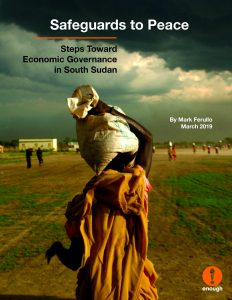
 Download the full report.
Download the full report.
By Mark Ferullo
Executive Summary
Hundreds of thousands killed,[i] injured, and raped.[ii] Millions more displaced.[iii] After five years of violence in South Sudan, the peace agreement signed in September 2018 is a hopeful attempt to end the corruption-fueled war. [iv]
But this is an uncertain time in South Sudan. The overall commitment to the peace agreement is low and implementation of some key provisions of the agreement has stalled completely. At the same time, President Salva Kiir continues to control South Sudan’s violent kleptocratic system of government that has deliberately constructed an infrastructure for corruption and private gain for its leaders. A peace agreement that is founded on this corrupt system is at high risk of crumbling because the system perpetuates a cyclical, competitive, and at times violent contest for power. In this system, the people of South Sudan suffer.
An Economic Governance Strategy…
To avoid backsliding into war, a deliberate strategy is needed to address South Sudan’s weak economic governance—the institutional structure and regulations that monitor and guide the functioning of a fair, accountable, and transparent economy. Without bold and innovative reforms and swift consequences for systemic corruption, the state’s economic resources will remain the ultimate prize—one that, as years of war have proven, is worth fighting over.
South Sudanese outside the leadership of the violent kleptocracy, such as civil society, youth groups, and opposition leaders, have consistently demanded an end to entrenched corruption. For South Sudanese fed up with the kleptocracy, the peace agreement is an opportunity to position economic governance reforms front and center during the implementation.
International supporters should follow the lead of South Sudanese civil society and chip away at the very foundation of the country’s violent kleptocracy. Narrowing nonemergency donor assistance to support discrete aspects of South Sudan’s economic governance would limit donor exposure and help to reestablish trust in the country’s leaders.
…That Includes Financial Pressures and Incentives…
This pre-transitional period before the three-year unity government forms is a rare opening to improve economic governance—but the leaders of the Kiir-led kleptocracy will not voluntarily dismantle the infrastructure of corruption they have built.
To motivate Kiir and the transitional government to stick to the peace agreement and adopt the recommendations in this report, international donors and partners should rely on financial incentives. The need to finance the peace agreement and boost the post-war economy provides international leverage to champion reforms. In particular, a coordinated international strategy should link financial assistance—which the government has requested—to the implementation of anti-corruption recommendations outlined in this report.
Financial pressures aimed at altering the kleptocracy’s incentive structure should work alongside the financial incentives. Tools of financial pressure, including targeted network sanctions and anti-money laundering enforcement, should be deployed against the government and corporate actors both inside and outside the country who enable and profit from the violent kleptocracy. Until the infrastructure of the system Kiir leads is dismantled, the incentives to crater the rule of law and undermine good economic governance will be too strong.
…Should Begin to Dismantle the Violent Kleptocracy
The Enough Project recommends 10 steps that would incorporate financial safeguards and economic oversight into the peace agreement.[v] These initial recommendations are not comprehensive but rather focus on specific policies that South Sudan and international supporters should jointly enact to lay the groundwork for a more transparent, inclusive, and responsive government.
When combined with financial pressures aimed at altering the leadership’s incentive structure, these recommendations—which are detailed in this report—should begin to dismantle the violent kleptocracy and also support economic governance reforms that can help to prevent a return to war.
- Install Central Bank Technical Advisory Body
- Appoint AU Transparency Envoy
- Start Independent National Audit
- Build e-Transparency Online System
- Set Up South Sudan Forum on Asset Recovery
- Establish International Commission Against Impunity
- Promote Gender Equality and Economic Opportunity for Women
- Elevate Role of the Independent Boundaries Commission
- Complete Corruption and Governance Review
- Broaden South Sudan Reconstruction Board
 Download the full report.
Download the full report.

